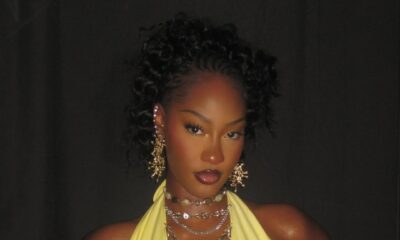Features
Mfonobong Inyang: Giving Women Their Flowers This History Month

A good story is multi-layered; it is littered with subplots that typically fly under the radar because notoriety is given to what people consider the dominant or preferred narrative. As I pondered on the latest instalment of fascism by the pseudo-democratic Nigerian state over the elections, I came across a story that wasn’t unfamiliar to me but managed to capture some of the pain points of our contemporary society, even though it occurred in a far-flung medieval era. It’s the story about the woman with the issue of blood – one often rendered with religious rhetoric without extrapolating its cultural and political perspectives.
As we celebrate Women’s History Month this march, I thought to use this seminal moment as a metaphor to highlight the plight of minority groups and underserved communities in this country. One thing we can agree on is that women are out there fighting for their lives in this country. Many people don’t have a problem with politicians brazenly rigging elections but ‘improper’ dressing by a woman is where they draw the line. Do you know how wild it is for feminine mannequins to be banned simply because some people think it’s offensive?
Salome Abuh was set on fire by suspected political thugs for daring to participate in governance, the same as Victoria Chintex who didn’t celebrate this year’s Mother’s Day because some people thought she was too effective as a community organiser. So they assassinated her. Bolanle Kareem was killed by people who are paid by her taxes; the trauma of a lawyer and her unborn children being killed on Christmas Day by supposed law enforcement officers is crazy. In 2023, people are still tweeting that it is blasphemous for a woman to be considered for a political position over a man. There is no faux outrage for corruption, terrorism or multi-dimensional poverty but a woman truly woman-ing is where these people froth at the mouth with some performative righteous anger. This takes me back to the story of this woman who represents not just the female gender but an avatar for people who have been systematically side-lined by their societies.
The Woman With The Issue of Blood
This is the very first wrong thing in this story; historians who didn’t maintain the main character’s energy had her nomenclature stripped from her. Unfortunately, we will never know her name or whatever else she represented simply because some people only identified her by her ailment, not her humanity. This is how women have had their exploits wiped off the history books. Even a married woman’s unofficial name is “the wife of” in Nigeria. A classic example is Funmilayo Ransome-Kuti. Most of us were taught in school that she was the first Nigerian woman to drive a car and nothing else. We found out later that she was more than that. She was the ‘Lioness of Lisabi’. She fought for the very independence that some unscrupulous politicians are abusing today, demanded suffrage for women and was the matriarch of one of Nigeria’s most patriotic families. Those who are behind this patriarchal construct are masters of conditioning, just like the faceless men who worshipped at the temple of the many-faced god in George R. R. Martin’s hit series, Game of Thrones. They broke a confident Arya Stark to the point she accepted that “A girl has no name. A girl is no one.”
She Said Within Herself
This woman knew that success is first an inside job. She realised the solution to her health challenges could pass her by if she didn’t act promptly because an opportunity of a lifetime must be seized. Before you break any glass ceiling, you must first break the limitations of your mind. This nameless woman grew up in a society where women were so dismissed to the point that women were not counted during any census because they were considered property rather than people. An example was when people who sat down to listen to a message from their Rabbi were being fed. The narrator of the first synoptic gospel phrased it accordingly: “they that had eaten were about five thousand men, besides women and children.” Almost inferring that only men had reckoning and other groups including women were just inconsequential additions or part of the multitude.
To make her case worse, there was a cultural stereotype for women who were on their menstrual cycles. They were considered unclean and unwelcome in any type of public gathering. Extreme menorrhagia meant she had no business being in any crowd but this woman get coconut head. So she pressed through the crowd and touched the solution with intent, different from those who were touching casually. Affirmative action is great but your salvation will be from within. You are the hero you have been waiting for. For this unknown woman, her faith made her whole.
Woman, Thou Art Loosed!
There was also a similar story of an equally unnamed woman who was physically bent over such that she couldn’t raise herself or stand erect. Jesus’ response was on brand: a message of hope and help, mirroring how we should respond to vulnerable persons and disenfranchised demographics. He didn’t look the other way or maintain a studied silence, he didn’t sit on the fence as if someone else was going through such pain. These were not surprising. What was rather surprising was that he had to explain himself to ‘religious’ people who questioned why he did such a good act. This scene for me speaks to modern-day Nigeria. Today, we are seeing the stark reality of ethnic and religious profiling. In a dark and dystopian model of politics, people are being disenfranchised simply by their names and looks in a country where many swear that “one Nigeria is non-negotiable.” Citizens pay taxes and contribute to socio-economic development but they cannot vote because feudalists, masquerading as democrats, have taken over governance. The silence of those who should know better is instructive. I hear what they are not saying: consent.
Jesus is not called “The Word” for nothing. He not only rebuked their hypocrisy, but he also took them to history and religious classes at the same time. He asked them what they would do if their ox fell into a ditch. Of course, there was grave silence. Notice how people know what is good for themselves and their businesses but when it comes to the country, they suspend their value system because our veneration of criminal behaviour is cultural. People of faith pray to God but vote for the devil, professors expel students for examination malpractice but rig elections for politicians, citizens complain of bad governance but love their oppressors, and those who claim to have fought for democracy that year are hell-bent on destroying it today. The religious bigots in Jesus’ day claimed they were descendants of Abraham but had a problem with the daughter of Abraham being healed. Just like many people in Nigeria claim they are nationalists until elections reveal that they are ethnic irredentists. Selah.
In the midst of all this madness, it’s very important to give certain women their flowers for representing.
- Olamide Olowe is the youngest black woman to raise $10 million in funding at age 26.
- Oluchi Enebeli is the founder of Web3Ladies.
- Ijeoma Akunyili became the first black person to be appointed as the Chief Medical Officer of Jersey City Medical Center
- Tems has got the music game in a chokehold, the global entertainment community is putting that respect on one of our own.
- 26-year-old Rukayat Shittu made history by emerging as the representative of Owode Onire state constituency, Kwara State.
- Ireti Kingibe braved the odds to represent the Federal Capital Territory as one of only three female senators in the 10th National Assembly.
- Efidi Bina Jennifer got stabbed in the face for exercising her franchise but that experience made her the face of audacity for the Nigerian voter.
These are just a handful of the amazing women that are making us proud at home and abroad. In my lifetime, I hope to see a cultural shift from the narrative of women belonging to the other room to the one annotated by The Notorious RBG – women belong to every room where decisions are being made.


















